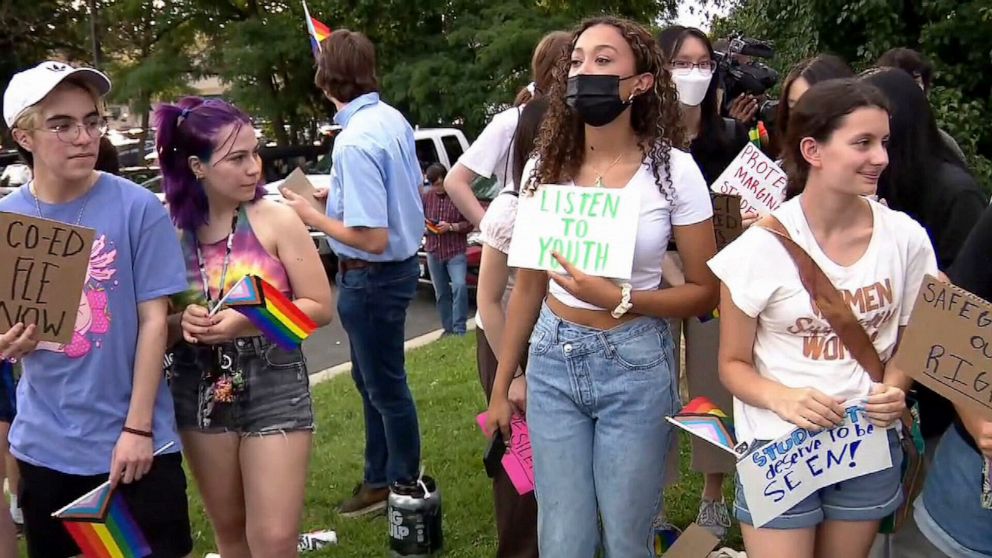Should people of all genders be taught sex education together? Educators weigh in
Some educators say many students can benefit from all-gender sex ed courses.
Students in Fairfax County, Virginia, are protesting to combine genders for their sex education courses. It's a move some health and education experts advocate for, saying it takes the shame out of reproductive and sexual health.
"Having all-gender sex education classes is one way we can model open, shame-free and unbiased communication about puberty, bodies, relationships and sexual behaviors with young people," said Wendy Sellers, a health educator and creator of "Puberty: The Wonder Years" adolescent curriculum.
She continued, "When we divide students into separate classes based on perceived gender, we perpetuate the stigma that sex education must be discussed behind closed doors and that only certain information can be shared with boys and other information shared with girls."
Fairfax County schools in Virginia currently separate students into two genders during sex education courses from the fourth through eighth grades.
Rivka Vizcardo-Lichter, a student and leader of a youth-led LGBTQ advocacy group told ABC affiliate WLJA that combining classes would be a way to recognize that all-gender sex education makes space for transgender and nonbinary youth to learn about their bodies in a more inclusive space.
Some educators agree: "We might actually forget to give information to learners they really need to know about how their bodies work because we assumed that all boys bodies are the same and all girls' bodies are the same," Gregory C. Carrow-Boyd, an adolescent health and religion educator in California, told ABC News.
Experts say all-gender sexual education classes allow for students to learn more comprehensive information about reproductive and sexual health that Eric Garrison, a certified sex counselor and sex coach in Virginia, says will likely be useful to all genders.

"We are sexual beings, from womb to tomb and from sperm to worm," said Garrison. "Chances are, either through who you date or who you're related to or if you're going to be a parent one day, you're going to have contact with another sex."
The Family Life Education Curriculum Advisory Committee for the Fairfax County district has recommended mixing genders in sex ed classes as part of a slate of suggestions for the school system. It's not yet clear if the Fairfax County School Board will follow the guidance.
"All advisory groups outline recommendations at the end of each school year," Julie Moult, a spokesperson for the FCSB, told ABC News. "Some are acted on and some are not. The board may choose to review this recommendation at some point this coming school year."
Nearby schools have implemented mostly gender-combined sex education, including Virginia's Arlington County and Alexandria City, as well as Maryland's Prince George's County.
"The main criticism is that it makes students uncomfortable. We have to ask ourselves, 'Why are students uncomfortable learning about their bodies?' People who are afraid of FLE [family life education] have the option to opt their children out," Willow Woycke, president of the D.C. transgender support network Transgender Education Association, said at a May school board meeting in favor of the recommendations.
Christy Haas, a certified sex therapist and educator, told ABC News she's worked with couples who are still uncomfortable having conversations about their reproductive or sexual health into their 70s.
"When we separate the boys from the girls, it tells us that there's something wrong, right?" said Haas. "The things that are happening in the girls' room are things that the boys don't need to know about and shouldn't know about. The things that are happening in the boys' room are the things girls don't need to know about and shouldn't know about."

As for potential downsides to co-ed sex learning, educators say it takes time to destigmatize sex education and students may feel shy or shameful about asking questions in front of people of other genders.
Educators say it may also be more difficult to ensure that the curriculum is comprehensive enough to educate students on things all genders will need to learn regarding sex education.
They also predicted that some parents may be hesitant of this change.
Kathleen Mallard, a Fairfax County resident, told WLJA a move to combine genders for students in grades four through eight would be wrong.
"Some of the discussions are about activities I think almost are sexualizing our children to some extent, up to the point of almost grooming them," said Mallard. "I think this is not a good idea to have them both all in the same class, boys and girls."
Several educators who spoke to ABC News agree that sex education in general is lacking in the U.S., despite its importance. According to the National Sex Education Standards (NSES), quality sex ed can help young people delay the onset of sexual activity, reduce the likelihood of unwanted pregnancy, reduce the risk of receiving and spreading sexually transmitted diseases/infections, as well as increases one's "self-protective knowledge and skills" against child sex abuse or sexual assault.
There is no federal required standard for sex education. The NSES has developed curricula in collaboration with sex education advocacy groups on guidelines for schools across the country, but it's purely voluntary for school districts adopt them.
"Too often, school boards are pressured by a vocal minority to implement sex education programs that are ineffective at best and harmful at worst," said Sellers, referencing abstinence-only sex education courses in particular.
Without a standard of education across the board, some educators say poor sex ed puts students at risk. Research has found that some programs, including abstinence-only programs, have been proven to reinforce harmful gender stereotypes, undermine public health, fail to reduce sexual risk behaviors, and "violate adolescent human rights."
According to the Centers for Disease Control and Prevention, about 41% of districts in the U.S. follow NSES guidelines.
"Young people are not getting accurate information and skill-development that would actually equip them to make safe and healthy choices as they grow into sexually healthy adults," Sellers told ABC News.




